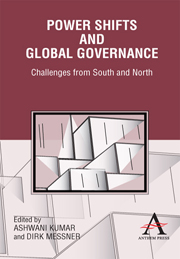Book contents
- Frontmatter
- Contents
- List of Contributors
- Foreword
- Power Shifts and Global Governance
- Part One Theoretical and Analytical Reflections on Global Governance
- 1 Introduction: Global Governance: Issues, Trends and Challenges
- 2 Four Lessons from the Present Global Financial Crisis for the 21st Century: An Essay on Global Transformation from a European Perspective
- 3 Global Civil Society: Emergent Forms of Cosmopolitan Democracy and Justice
- 4 Institutional and Policy Implications of International Public Goods: The Case of Global Commons
- 5 Economic Challenges for Global Governance
- 6 The Rule of Law in Multilateral Institutions and International Aid for Development: Judicial Reform in the Global Order
- Part Two Power Shifts, Regional Experiences and Global Challenges
- Part Three Case Studies in Global Governance
- Notes
6 - The Rule of Law in Multilateral Institutions and International Aid for Development: Judicial Reform in the Global Order
from Part One - Theoretical and Analytical Reflections on Global Governance
Published online by Cambridge University Press: 05 March 2012
- Frontmatter
- Contents
- List of Contributors
- Foreword
- Power Shifts and Global Governance
- Part One Theoretical and Analytical Reflections on Global Governance
- 1 Introduction: Global Governance: Issues, Trends and Challenges
- 2 Four Lessons from the Present Global Financial Crisis for the 21st Century: An Essay on Global Transformation from a European Perspective
- 3 Global Civil Society: Emergent Forms of Cosmopolitan Democracy and Justice
- 4 Institutional and Policy Implications of International Public Goods: The Case of Global Commons
- 5 Economic Challenges for Global Governance
- 6 The Rule of Law in Multilateral Institutions and International Aid for Development: Judicial Reform in the Global Order
- Part Two Power Shifts, Regional Experiences and Global Challenges
- Part Three Case Studies in Global Governance
- Notes
Summary
Introduction
Over the last few years, the concept of global governance, invoked as a useful tool to analyse certain institutional practices of governments, has acquired a preeminent level of popularity in the academic community as well as within the discourse of international cooperation. In the field of international cooperation, the term has also been recognized as an operative expression for analyzing the reform of the state. One of the main aspects of the term global governance is that it has established state management as characterized by an comprehensive approach, covering different elements of the management of the state, from private public service concessions (such as transportation) to the administration of justice. The main objective of this paper is to analyse global governance within the scope of multilateralism and international cooperation in terms of the reform of state, focusing on judicial reform in particular. It is our contention to establish that concrete analysis of the development and evolution of international aid backing judicial reform in different countries is a good means to represent certain aspects and develop general conclusions about global governance.
The origins of international aid that focuses on improving the law and judiciaries stems from the end of the Second World War. Two main aspects supported this phenomenon: (a) the increasing and constant interest in protecting human rights and (b) the creation of the international justice courts.
- Type
- Chapter
- Information
- Power Shifts and Global GovernanceChallenges from South and North, pp. 123 - 138Publisher: Anthem PressPrint publication year: 2010

